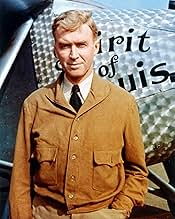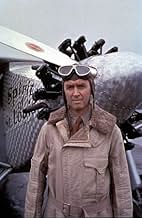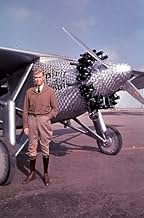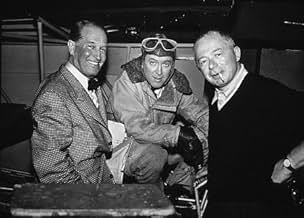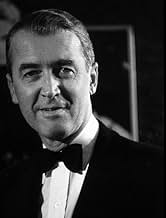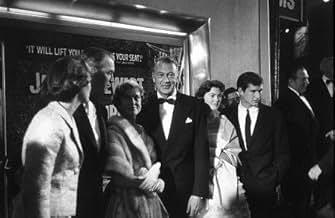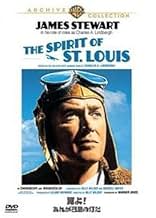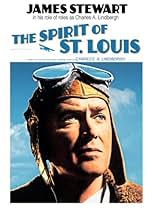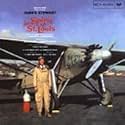Aggiungi una trama nella tua linguaCharles 'Slim' Lindbergh struggles to finance and design an airplane that will make his New York to Paris flight the first solo transatlantic crossing.Charles 'Slim' Lindbergh struggles to finance and design an airplane that will make his New York to Paris flight the first solo transatlantic crossing.Charles 'Slim' Lindbergh struggles to finance and design an airplane that will make his New York to Paris flight the first solo transatlantic crossing.
- Regia
- Sceneggiatura
- Star
- Candidato a 1 Oscar
- 2 vittorie e 1 candidatura in totale
- Burt
- (non citato nei titoli originali)
- Mother from Oklahoma
- (non citato nei titoli originali)
- Clerk
- (non citato nei titoli originali)
- Crowd Member in France
- (non citato nei titoli originali)
- Crowd Member in France
- (non citato nei titoli originali)
- Reporter
- (non citato nei titoli originali)
- Dad - Farmer
- (non citato nei titoli originali)
- Farm Boy
- (non citato nei titoli originali)
- Train Passenger
- (non citato nei titoli originali)
- Blythe
- (non citato nei titoli originali)
- Crowd Member in France
- (non citato nei titoli originali)
Recensioni in evidenza
The film deals with little else but Lindbergh's career up to and including his monumental flight from Roosevelt Field to Le Bourget in France in 33 hours back in 1927. We see Lindbergh as a mail pilot, then attempting to raise funds to buy a plane, though a plane ended up being built by a small aircraft company. And then the flight itself - and Wilder somehow makes it suspenseful and interesting. He really captures the pilot's complete isolation with no copilot or radio, talking to himself (Stewart provides the narration), sleep-deprived, with only the sound of the plane for company, falling asleep at the wheel, and finally, unsure where he was and using map topography to figure it out. It's an amazing story. During the flight sequence, there are flashbacks to earlier points in Lindbergh's life.
The Spirit of St. Louis is replicated, and once seen, it's very hard to believe it got out of Roosevelt Field. Lightweight, Lindbergh made sure it carried only the absolute essentials and refused to even bring a parachute or radio because of the extra weight.
Today, for me anyway, James Stewart is just James Stewart, one of the great film stars and actors. I'm blissfully unaware of his age most of the time, and I was in this film as well. For me, he was tall, lanky Lindbergh, determined to succeed and very likable. I realize that John Kerr was offered the role first, but if he had taken it, the film would have flopped initially, as it did starring Stewart, due to the huge budget, but I don't believe it would hold up as well as it does today.
Heroes are very rarely discussed as human beings, and many of their words and actions are taken out of context and out of the era. Lindbergh was ahead of his time in his environmental and aeronautical pursuits and very much of his time in some of his political beliefs. And as we now know, fidelity wasn't one of his strong points. Reading an excellent, well-researched biography like Scott Berg wrote is preferable to making snap judgments. Hindsight is easy.
Complicated men have complicated lives. You don't achieve what Lindbergh did in the Spirit of St. Louis by being ordinary. Wilder does an excellent job in showing his crowning achievement, and in evoking the excitement people felt at the time.
Billy Wilder adapts from Charles A. Lindbergh's Pulitzer Prize winning novel of the same name, in what is a re-creation of Lindbergh's historical 1927 solo flight. Boosted by a considerably strong lead performance from James Stewart {himself a pilot} as Lindberg, and containing an intelligent screenplay from Wilder and Wendell Mayes, Spirit Of St. Louis is a sincerely well told story.
In what at times threatens to become a monotonous film, Wilder keeps it ticking over by using flashbacks to Lindbergh's life. After the nicely told build up to the event, such as the peril being realised as Nungesser and Coli go missing {never to be found} whilst attempting the same trip in reverse, we learn stuff like how he come to buy his first plane and his work with the flying circus. This is all relative to understanding the man and his obvious passion for flying. This also helps to give us a complete picture of Lindbergh, thus putting us with him in his isolated cockpit as he undertakes this dangerous journey. Battling isolation {his only company is a fly} and chronic tiredness, it's here where Stewart perfectly portrays Lindbergh's devotion to the task. Aided by a terrific score from Franz Waxman and Academy Award nominated effects by Louis Lichtenfield, Wilder's movie turns out to be an engaging human interest story that got a thoroughly professional production. 7/10
I found it interesting because I find Charles Lindberg's feat amazing and worth watching. I also enjoyed the widescreen picture. I'm surprised it's not available on DVD. The most amazing part of Lindberg's feat, from what I discovered watching the movie, was that he went 30 hours without sleep before he even took off! To stay awake for the entire trip to Paris after that was incredible.
To keep the viewers' interest, the film flashes back a number of times to Lindberg's earlier days and most of that is pretty interesting. Yes, there are some lulls in here and the movie could have been shortened from its 138 minutes but Stewart does a nice job of entertaining us, as he usually did.
I do have one question, one complaint and one suggestion. My question is, "Why is there no mention of his wife, Anne Morrow?" Odd, they totally left her out of this. She was famous in her own right.
My complaint is the emphasis - it's brought up twice in case you missed it the first time - on Lindberg not believing in prayer, only the things he could see. Pagan Hollywood just has to get their agenda in, and much of it began in the 1950s when moral restrictions began to slowly ease. This is just one more example.
They also left out what happened right after the flight, thus making the film more of a story about the voyage than of Lindberg's aviation career. Too bad, because, as many of you might know, his son's kidnapping is one of the biggest stories of that era. My suggestion then is that a full biography, with the emphasis on this flight across the Atlantic, might have been a better way to go. I think you would see that with a re-make, along with a faster- moving film.
Lo sapevi?
- QuizThe movie was a box office disaster when originally released in 1957, grossing less than $3 million and costing about $7 million.
- BlooperOn his approach to St. John's, Newfoundland in the fog, Lindbergh is depicted as being concerned about colliding with a mountain peak. However, there is no even remotely mountainous terrain anywhere in the vicinity of St. John's.
- Citazioni
Charles Lindbergh: Did you wait in the rain all night?
Mirror Girl: Yes.
Charles Lindbergh: Are you from New York
[City]
Mirror Girl: No.
Charles Lindbergh: Long Island?
Mirror Girl: No. I'm from Philadelphia.
Charles Lindbergh: You came all the way from Philadelphia?
Mirror Girl: I had to. You needed my mirror.
- ConnessioniFeatured in America at the Movies (1976)
- Colonne sonoreRio Rita
(uncredited)
Music by Harry Tierney
Lyrics by Joseph McCarthy
Played on a phonograph when Lindbergh is trying to rest before the flight
I più visti
- How long is The Spirit of St. Louis?Powered by Alexa
Dettagli
- Data di uscita
- Paese di origine
- Lingua
- Celebre anche come
- The Spirit of St. Louis
- Luoghi delle riprese
- Santa Maria, California, Stati Uniti(Flight Training School)
- Aziende produttrici
- Vedi altri crediti dell’azienda su IMDbPro
Botteghino
- Budget
- 6.000.000 USD (previsto)
- Tempo di esecuzione2 ore 15 minuti
- Colore
- Mix di suoni
- Proporzioni
- 2.35 : 1
Contribuisci a questa pagina



